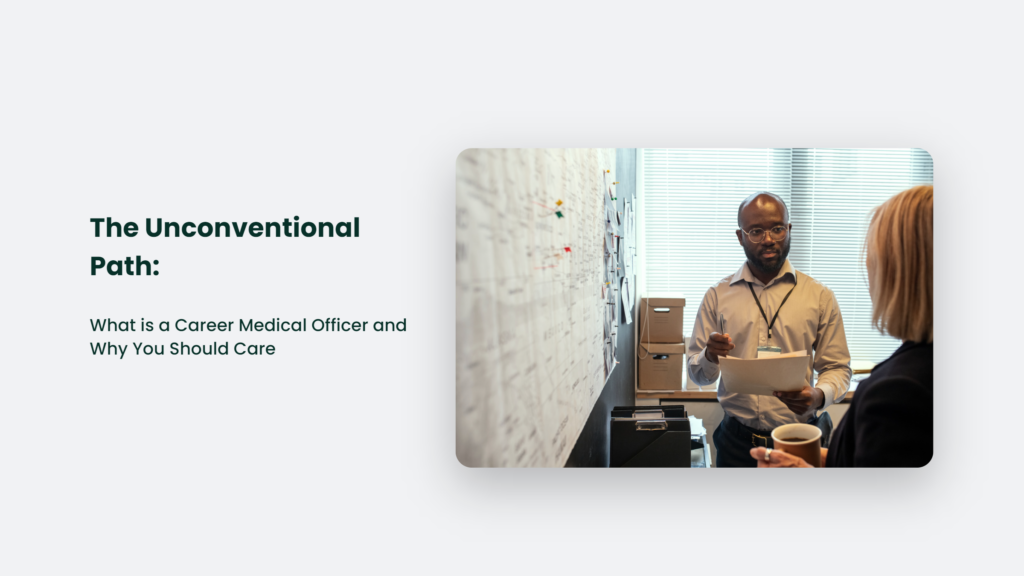

What is a Career Medical Officer and Why You Should Care

As Seen On
Picture this: You’re at a party, and someone asks you, “What do you do for a living?” You take a deep breath, muster up your courage, and say, “I’m a Career Medical Officer.” The room goes silent, and you can feel the curiosity in the air. But what is a Career Medical Officer (CMO), and why should anyone care? Buckle up because we’re about to dive into the world of CMOs and explore the ins and outs of this fascinating profession.

What is a Career Medical Officer?
A Career Medical Officer is a medical professional who has chosen to specialize in a unique and often misunderstood field. They’re not your typical doctors but play a crucial role in the healthcare system. CMOs are responsible for providing medical care and support to patients in various settings, such as hospitals, clinics, and even remote locations. They’re the unsung heroes of the medical world, the ones who keep the wheels turning behind the scenes.
But what sets CMOs apart from other medical professionals? For starters, they have a broader scope of practice than most doctors. While most medical practitioners and many physicians focus on a specific specialty, CMOs are trained to handle various medical issues. It makes them incredibly versatile and valuable in the healthcare industry.
The Jack-of-All-Trades in the Medical Field
Think of a CMO as the Swiss Army knife of the medical world. They have the skills and knowledge to tackle various medical challenges, from diagnosing and treating common ailments to managing complex medical conditions. This adaptability allows them to provide top-notch care to patients in diverse settings.
For example, a CMO might work in an emergency department, where they’ll assess and treat patients with a wide range of medical issues. They could also work in a rural clinic, where they will refer patients and must be prepared to handle anything from a simple cold to a life-threatening emergency.
The Road Less Traveled: Becoming a Career Medical Officer
So, how does one become a CMO? It’s not a walk in the park, that’s for sure. Becoming a Career Medical Officer typically begins with a medical degree, followed by several years of postgraduate training in various medical specialties. This extensive training allows CMOs to develop a well-rounded skill set that enables them to excel in their unique role.
But the learning doesn’t stop there. CMOs must also participate in ongoing professional development to stay up-to-date with medical advancements and best practices. This commitment to lifelong learning sets CMOs apart from other medical professionals and ensures they’re always prepared to provide the best possible care to their patients.
The Perks of Being a Career Medical Officer
Being a Career Medical Officer (CMO) is like being a Swiss Army knife in the medical world – versatile, always in demand, and ready for any challenge. It’s not just a job; it’s an adventurous journey through the healthcare system.
First off, let’s talk about what CMOs do. They work in various settings like emergency departments and rural clinics, handling everything from sniffles to life-threatening emergencies. Think of them as medical chameleons, adapting to whatever medical mystery comes their way.
Becoming a CMO is like embarking on a healthcare odyssey. It starts with a medical degree, followed by postgraduate training in different specialties. This diverse training makes CMOs well-rounded, and they’re always topping up their knowledge to keep up with medical advancements. They’re lifelong learners with stethoscopes.
Now, the perks – and oh, are there perks! CMOs enjoy a broad scope of practice that keeps the work exciting and diverse. They can make a real difference in the lives of their patients, providing comprehensive care in various settings. Plus, they often have more flexible schedules than other medical roles, which is a big win for work-life balance.
The skillset of a CMO is impressive. They must be top-notch in communication, organization, leadership, problem-solving, critical thinking, decision-making, multitasking, time and stress management, teamwork, and conflict resolution. Imagine juggling all these skills while wearing a lab coat and a superhero cape – your typical CMO.
So, next time someone asks about the perks of being a Career Medical Officer, you can tell them it’s like being a resident medical officer and superhero, minus the cape, but with all the life-saving action. Plus, the satisfaction of knowing you’re an integral part of the healthcare system, making a tangible difference every day.
The Impact of Career Medical Officers on the Healthcare System
Career Medical Officers (CMOs) are like the Swiss Army knives of the healthcare world – versatile, indispensable, and sometimes working in the background, but with a significant impact. They’re the unsung heroes in various healthcare settings, including emergency departments and rural clinics.
Their role is crucial in bridging the gap between patients and the healthcare system, especially in underserved populations and remote areas (CJ&CO).
Now, let’s talk about their influence on healthcare. CMOs provide comprehensive medical care and bring a unique blend of clinical and managerial skills to the table. Their involvement in leadership positions, like being part of the boards of directors or even CEO roles, has positively impacted organizational performance.
It includes financial and operational resources management improvements, such as profitability, operational efficiency, and market share. When CMOs are in charge, hospitals tend to do better financially and operationally (BMC Health Services Research).
The Unsung Heroes of Healthcare
The world of healthcare is filled with unsung heroes, and Career Medical Officers (CMOs) are shining stars among them. These versatile medics don’t just stick to one department or specialty. Instead, they’re like the Swiss Army knives of the medical world, adept at handling everything from a sneeze to a crisis in any setting, be it a bustling city hospital or a remote rural clinic.
Their road to becoming a CMO is no stroll in the park, requiring extensive training and an unquenchable thirst for lifelong learning.
But it’s not all hard work and no play; these medical maestros enjoy flexible schedules that are as rare in healthcare as a calm day in the ER. And let’s not forget their superpower – bridging the healthcare gap, especially in underserved areas, ensuring that everyone gets the care they need, no matter where they are.
Frequently Asked Questions:
What are the benefits of becoming a Career Medical Officer?
Some benefits of becoming a CMO include the opportunity to make a real difference in patients’ lives, a versatile and broad scope of practice, and more flexibility in work schedules compared to traditional medical careers.
Where do Career Medical Officers typically work?
CMOs can work in a variety of settings, including hospitals, clinics, and remote locations. They may work in emergency departments, rural clinics, or even as part of a medical team providing care in disaster-stricken areas.
The Bottom Line:
In conclusion, Career Medical Officers are the unsung heroes of the medical world, providing essential care to patients in various settings and ensuring the healthcare system runs smoothly. So, the next time someone asks you, “What is a Career Medical Officer?” you can confidently explain the vital role these professionals play in our healthcare system and why their work is worth celebrating.
Konger
Up until working with Casey, we had only had poor to mediocre experiences outsourcing work to agencies. Casey & the team at CJ&CO are the exception to the rule.
Communication was beyond great, his understanding of our vision was phenomenal, and instead of needing babysitting like the other agencies we worked with, he was not only completely dependable but also gave us sound suggestions on how to get better results, at the risk of us not needing him for the initial job we requested (absolute gem).
This has truly been the first time we worked with someone outside of our business that quickly grasped our vision, and that I could completely forget about and would still deliver above expectations.
I honestly can't wait to work in many more projects together!
Disclaimer
*The information this blog provides is for general informational purposes only and is not intended as financial or professional advice. The information may not reflect current developments and may be changed or updated without notice. Any opinions expressed on this blog are the author’s own and do not necessarily reflect the views of the author’s employer or any other organization. You should not act or rely on any information contained in this blog without first seeking the advice of a professional. No representation or warranty, express or implied, is made as to the accuracy or completeness of the information contained in this blog. The author and affiliated parties assume no liability for any errors or omissions.

